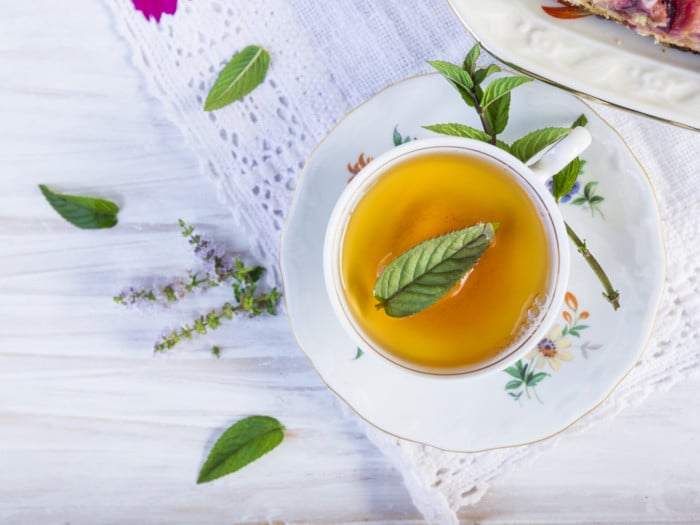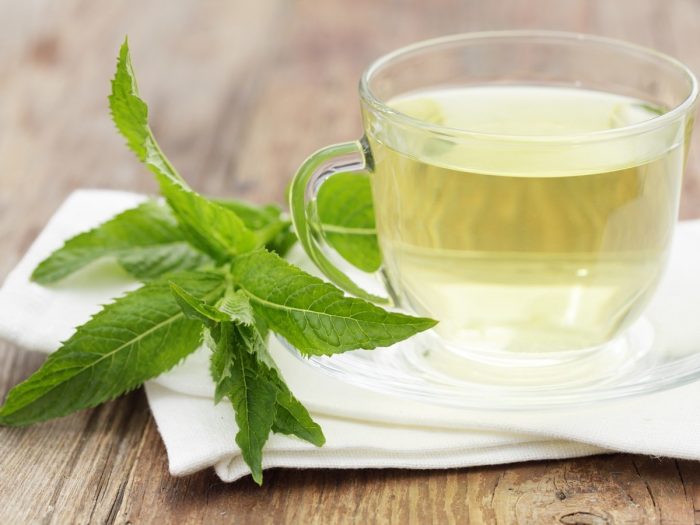Peppermint tea is an herbal infusion made from peppermint leaves and it has been used in many medicinal applications. It is enjoyed around the world, not just for its refreshing taste but also for its therapeutic uses. It is popular for its possible ability to relieve headaches, treat sinuses, and ease digestive problems. Moreover, it is also known to be beneficial for your mental health as its calmative properties make you relax, release stress, and mental pressure.
What is Peppermint Tea?
The scientific name of peppermint is Mentha piperita, and it is a cross between water mint and spearmint. It is native to Europe and is used in breath mints, candies, chocolates, syrups, medicines, and as an essential oil for aromatherapy. The menthol flavor in this tea appeals most to tea lovers, making it one of the most popular varieties in the world. Few medicinal teas have an unpleasant flavor that you may want to dilute with lemon or honey. If you need a strong-flavored tea and a caffeine kick of black teas, adding a good caffeine-free herb tea such as peppermint tea is a good idea. [1] [2]
Peppermint Tea Benefits
Peppermint tea is known to be soothing. But what else does this widely available tea have for our body in terms of benefits? Let’s explore some of the medicinal applications of peppermint tea below.

Add a leaf of peppermint to your tea for freshness. Photo Credit: Shutterstock
May Relieve Stress and Headaches
Peppermint oil, due to its menthol content, possesses the capacity to alleviate headaches by enhancing blood circulation and delivering a refreshing, cooling sensation. Applying peppermint oil drops to the nose is also effective in reducing headache intensity and frequency, similar to lidocaine. [3] [4] [5] [6]
While the aroma of peppermint tea may suggest potential muscle relaxation and headache relief, it lacks scientific findings. Although the efficacy of peppermint oil in reducing tension headaches and migraines has been established, the specific role of peppermint tea, particularly concerning its aroma, necessitates further investigation and research.
May Aid in Weight Loss
Peppermint tea offers calorie-free assistance in weight management. Peppermint’s pleasant flavor can help satisfy sweet cravings and curb appetite. Scientifically confirmed, inhaling peppermint scent reduces calorie intake and hunger. Another, 2013 study in 13 healthy people found that taking a peppermint oil capsule resulted in reduced appetite compared to not taking peppermint. Selecting peppermint tea over pre-dinner snacks is a prudent approach to appetite control. [7] [8]
May Promote Sleep
Caffeine-free peppermint tea can aid in stress reduction and muscle relaxation before sleep, promoting a better sleep environment. While scientific evidence on direct sleep enhancement is limited, a noteworthy study discovered that inhaling three drops of peppermint oil daily for seven days led to improved sleep quality among individuals. Therefore, making it an alluring option for relaxation before bedtime. [9] [10]
May Help Manage Upset Stomach & Digestive Issues
Peppermint tea has commonly been used for digestive issues like IBS, indigestion, and constipation, as suggested by Handbook of Herbs and Species (Second Edition), Volume 1, 2012. [11]
In 2014, a comprehensive review of nine studies involving 726 patients with irritable bowel syndrome (IBS) found that potent peppermint oil provided significant relief from symptoms when compared to a placebo. In a separate study of 72 IBS individuals, peppermint oil capsules delivered a notable 40% symptom reduction in four weeks, surpassing the placebo’s 24.3% improvement. Furthermore, a review of 14 clinical trials with 2,000 children highlighted peppermint’s efficacy in reducing abdominal pain, while another study published by Complementary Therapies in Medicine found peppermint oil drops alleviating nausea and vomiting in chemotherapy patients. [12] [13] [14] [15]
While peppermint oil has been the focus of research, peppermint tea, with its milder concentration, holds potential benefits for digestion, though further scientific exploration is needed.
[16]How to Use: You can use organic peppermint tea bags as they are considered a carminative because they help move gas through the body as it accumulates.
May Aid in Anti-Helicobacter Pylori Activity
Research led by Israel Castillo-Juárez et al. to study the effects of medicinal herbs on Helicobacter pylori suggests that peppermint exhibits inhibitory effects and may help in giving relief from gastrointestinal disorders. [17]
It was further substantiated by a study in 2015, where, peppermint leaves demonstrated anti-Helicobacter pylori activity in vitro, with MIC values ranging from 15.6 to 250 μg/ml, depending on the solvent used, suggesting their promising bioactivity against H. pylori. [18]

Peppermint tea is an herbal infusion made from peppermint leaves.
Has Antibacterial properties
Peppermint tea’s potential antibacterial properties stem from research on peppermint oil. Peppermint oil has shown effectiveness against various bacteria, including foodborne pathogens and mouth bacteria, as discussed in studies. Additionally, menthol, found in peppermint, has demonstrated antibacterial and antifungal properties. Peppermint tea’s nutrient content, highlighted in research, may also contribute to immune support. While studies focus on peppermint oil, these findings suggest that peppermint tea could have antibacterial benefits, albeit further research is needed to confirm its specific effects. [19] [20] [21] [22] [23] [24] [25]
May Boost Immunity
In 2010, research published in Toxicology & Industrial Health on the antioxidant properties of Mentha species suggested that peppermint can be used as a natural antioxidant. A study by Gokalp Is canon et al. found that menthol present in peppermint has antimicrobial properties and may help inhibit pathogens. Peppermint oil is rich in antibacterial properties and may inhibit the growth of bacteria. [26] [27] [28]
Peppermint tea is made using peppermint which according to USDA contains B vitamins, calcium, sodium, phosphorus, potassium, and magnesium. These nutrients may help fight off illnesses and perform necessary functions to keep the body working healthily. [29] [30]
May Freshen Your Breath
Peppermint’s antibacterial properties make it a common ingredient in dental products like toothpaste and gum for breath freshening. For example, a 2013 study with female students found that a peppermint mouth rinse improved breath. Additionally, a 2017 study showed that gargling with peppermint, lemon, and tea tree oils helped improve bad breath in participants following spine surgery. While there’s no direct evidence for peppermint tea, its peppermint oil content may contribute to fresher breath. [31] [32] [33]
May Prevent Nausea & Vomiting
It is used for relieving nausea and vomiting due to antispasmodic properties, which can help to relax the muscles of the digestive tract. In a study, Inhaling peppermint oil significantly reduces post-surgery nausea in 123 individuals. [34] [35] [36]
May Lower Cholesterol Levels
Based on an animal study, peppermint may help prevent dyslipidemia or abnormally high cholesterol levels and high levels of glucose. Further, a recent animal study on the effects of peppermint extract stated that peppermint extract can lower bad LDL cholesterol levels. Higher cholesterol levels are associated with cardiovascular diseases. However, more research needs to be conducted on this. [37] [38]
How to Make Peppermint Tea?
It’s easy to make peppermint tea at home, all you need is a few peppermint leaves (fresh or dried) and water. Let’s take a look at the recipe in detail.

Peppermint Tea Recipe
Instructions
- If you are making peppermint tea, take 10 fresh mint leaves and rinse them properly under the faucet.
- Once properly rinsed, rub the leaves in between your fingers. By doing so, you will be releasing the flavor of the herb. You can also use a mortar or a pestle to crush the leaves. Additionally, you can use the back of a spoon to lightly crush them if you do not have the aforementioned tools. Ensure that you don't over crush the leaves.
- Take a mug, and place the lightly crushed leaves in it. Meanwhile, bring 250 ml of water to a boil. Once boiled, allow the water to cool slightly before you pour it in the mug. Remember that, peppermint tea brews well in hot water and not boiling water.
- Carefully pour the water on the peppermint leaves, after you have let the water cool. Once all the leaves are submerged in the water, cover the mug and let it steep for at least 7 minutes. If you want the tea to be stronger, let it steep for longer -probably around 15 minutes.
- After that, strain the leaves out using a filter or a spoon. You can also add sugar or honey to your tea as per taste. Furthermore, you can enhance the taste by adding lemon to it.

Notes
Where to buy Peppermint Tea?
Preparing peppermint tea at home is even easier using one of the following ingredients:
- Organic peppermint tea, leaf bags
- Organic peppermint leaf tea, loose bags
- You also get flavored teas like peppermint cinnamon tea
You can easily find this tea at herbal tea stores, supermarkets and you can also buy them online. So steep your tea, sip, and relax!!
Word of caution: Though peppermint tea is powerful and offers a wide range of health benefits, there are still some possible side effects of having this tea.
A study states that the menthol found in peppermint can cause contact dermatitis and allergic reactions such as allergic asthma. The reactions are typically mild but consulting a doctor about possible allergies is always a good idea. Besides that, grab some peppermint leaves and get brewing! [39]

